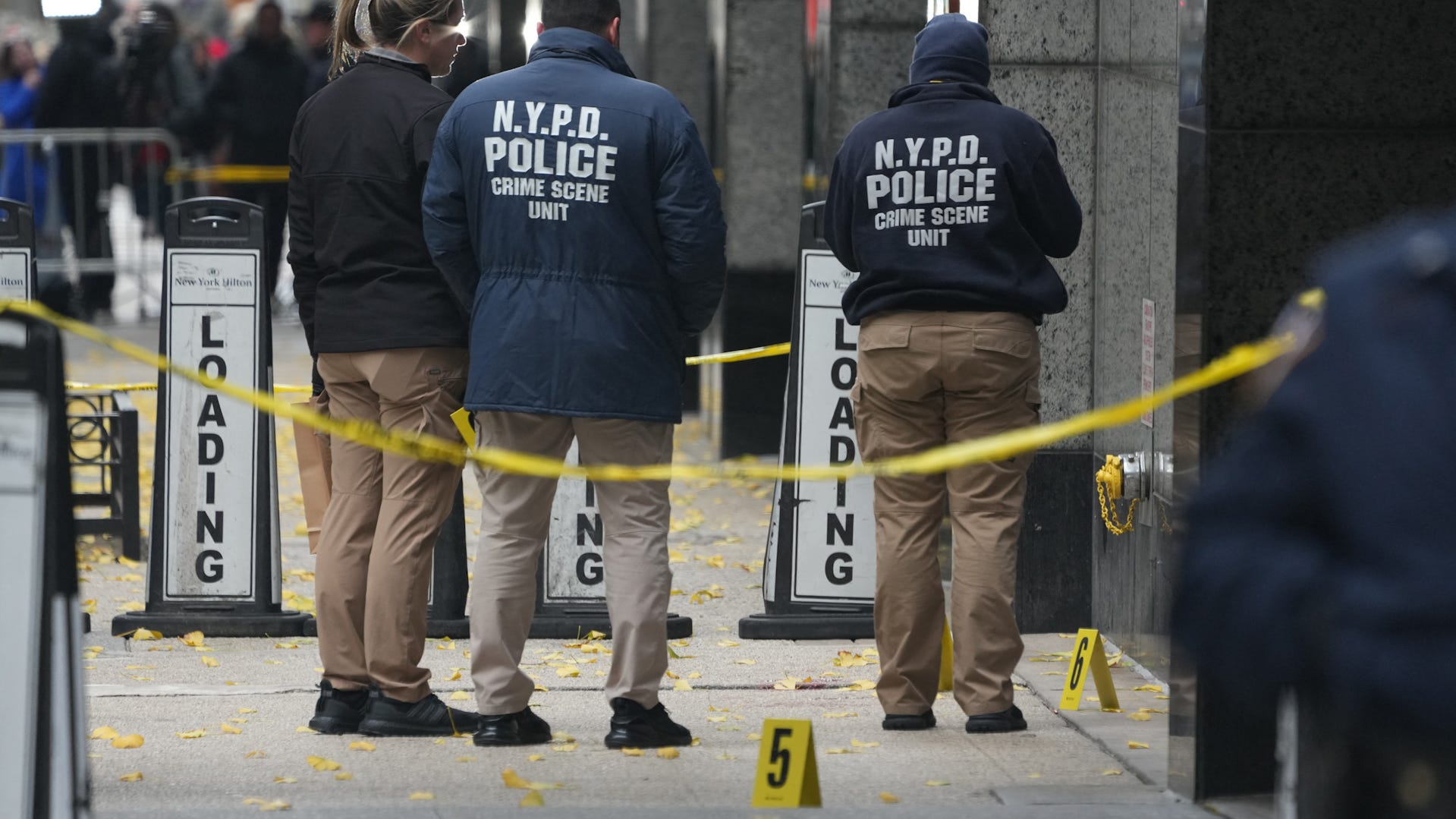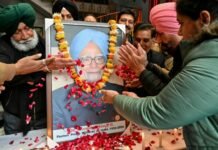
Health insurance industry faces backlash after UnitedHealthcare CEO death
There’s a common theme in the wave of unsympathetic posts about UnitedHealth exec Brian Thompson’s death: rage against the health insurance industry.
“The net is tightening” in the search for the gunman who brazenly killed United Healthcare CEO Brian Thompson in Midtown Manhattan, New York City Mayor Eric Adams said Saturday.
“We’re going to bring this person to justice,” Adams told reporters in a video published by MSNBC.
The search has stretched into its fourth day and appears to be expanding as police say they believe the killer successfully fled New York City after the shooting. The FBI said Friday it has joined the search and is offering $50,000 toward the reward for an “unknown suspect” seen in previously released photos.
On Wednesday morning, Thompson’s killer covered his face and was waiting outside a Hilton hotel, where Thompson, 50, was set to speak at an investment conference, officials said. Surveillance cameras caught what happened next on video: When Thompson appeared, the shooter fired multiple times from behind him at close range at about 6:45 a.m.
Authorities haven’t said whether they have identified the suspect.
“We don’t want to release that now,” Adams said. “If you do, you’re basically giving a tip to the person we are seeking, and we do not want to give him an upper hand at all. Let him continue to believe he can hide behind the mask.”
Adams’ office did not immediately respond to an email seeking more information.
The shooting set off a massive search, with investigators now offering a total reward of $60,000 for information that leads to an arrest and conviction.
Police recovered bullet casings inscribed with the words “deny,” “defend” and “depose,” multiple news outlets reported. Though the terms are relevant to health insurance companies’ strategies for rejecting claims, police have not yet said what the motive might have been.
“Every indication is that this was a premeditated, preplanned, targeted attack,” New York City Police Commissioner Jessica Tisch said earlier this week.
The crime also prompted a wave of public apathy and vitriol toward the health insurance industry and executives seen as gatekeepers to life-saving care for a handsome profit.
Police found a backpack in Central Park on Friday that is similar to the one seen in surveillance footage carried by the shooter, the New York Times and CNN reported, citing anonymous law enforcement sources.
The contents of the backpack were still unknown because it was sent directly to a lab, the outlets reported. It was found near the 65th Street transverse bridge, along what could have been the route the gunman took when he fled the scene, the Times reported.
Police on Thursday released photos of who they say is a “person of interest.” The surveillance photos show a man wearing a hooded jacket and a black backpack that appears different from the gray backpack the shooter carried, but without a face covering.
Police are analyzing evidence found at the scene, including a water bottle and wrapper for a protein bar the shooter may have bought at a nearby Starbucks before the shooting. They’re analyzing video with help from an extensive surveillance camera system in the city.
They think the shooter came into the city by bus on Nov. 24, and stayed at a hostel using a fake New Jersey ID, the New York Times reported.
New York Police Department officials believe he left the city after the shooting and may have again taken a bus out, according to CNN.
The shooter was likely “proficient in the use of firearms,” NYPD Chief of Detectives Joe Kenny said. During the shooting, his gun appeared to jam at one point, but he managed to clear it and continue firing.
Experts told USA TODAY the gunman appeared calm and collected as he carried out the crime, and raised questions about whether this could have been a professional hit job, while others cast doubt on the theory.
“It looks like this guy may have had some experience, and I’m sure investigators are entertaining the possibility,” said Michael Alcazar, a former detective with the New York City Police Department and a professor at the John Jay College of Criminal Justice. “It definitely crossed my mind.”
The brazen killing unleashed social media scorn at his company and a U.S. health insurance industry that serves as gatekeeper to the nation’s $4.5 trillion health care system.
Although social media is often filled with hatred and “good riddances” after a high-profile murder, and there have been instances of violence against people involved in health care before, the reaction this time felt different, experts said.
The Midtown Manhattan killing tapped a groundswell of public anger over an industry the public often only knows through impersonal delays and denials to needed health care, said Wendell Potter, a former CIGNA executive who became a whistleblower against the health insurance industry.
“I’ve been hearing for years now from people who have been so frustrated because of denials or delays of care, and this was an opportunity for people to vent and to take out their anger against someone who just became known to them all of a sudden,” Potter said.
Trying to file an insurance claim at UnitedHealthcare, among the nation’s largest insurance companies, is a “humiliating and godawful slog,” one commenter wrote. “Guessing this (killer) might be a disgruntled policy holder.” Read more.
Thompson lived in Maple Grove, Minnesota, about 15 miles northwest of Minneapolis.
Thompson is survived by his two sons and wife, Paulette Thompson, a physical therapist of over 20 years who graduated from the same college as her husband, according to her workplace bio.
He graduated from the University of Iowa in 1997 with a Bachelor’s in business administration and accounting, according to his LinkedIn.
Thompson started at UnitedHealth Group in 2004, and over the next two decades climbed up the ranks, working in several departments before taking up his most recent role overseeing its health insurance unit. The company on Wednesday described Thompson as “a highly respected colleague and friend to all who worked with him.” Thompson was named CEO in April 2021.
Mike Tuffin, president and CEO of AHIP, a commercial health insurance trade association, said in a statement he was “Heartbroken and horrified by the loss of my friend Brian Thompson.”
“He was a devoted father, a good friend to many and a refreshingly candid colleague and leader,” Tuffin said. “All of us at AHIP are thinking of Brian’s family and his UnitedHealth Group colleagues at this difficult time.”
Contributing: Ken Alltucker, N’Dea Yancey-Bragg, Phaedra Trethan, Donovan Slack, Michael Loria, Christopher Cann, Jorge L. Ortiz and Mary Walrath-Holdridge, USA TODAY; Reuters


























